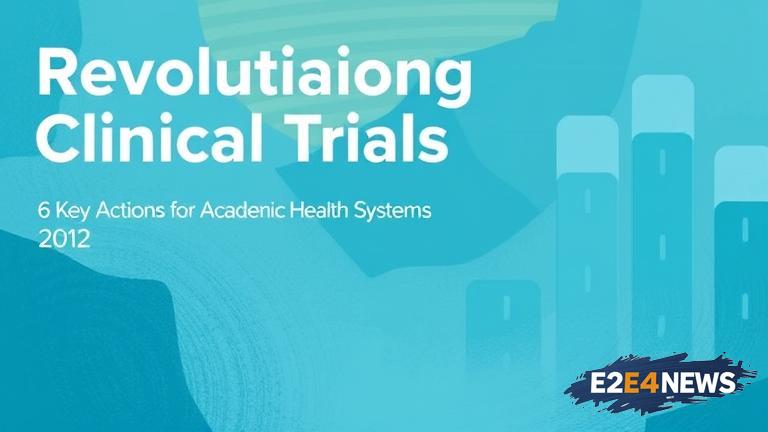The clinical trials landscape is evolving rapidly, and academic health systems must adapt to remain competitive. By implementing six key actions, these institutions can establish high-performing clinical trials programs that drive innovation, improve patient outcomes, and contribute to the advancement of medical science. Firstly, academic health systems must develop a clear strategic plan that aligns with their overall mission and goals. This plan should prioritize areas of focus, such as specific disease areas or emerging technologies, and establish metrics for success. Secondly, institutions must invest in robust infrastructure, including state-of-the-art facilities, cutting-edge technology, and skilled personnel. This infrastructure will enable the efficient conduct of clinical trials, from study startup to closeout. Thirdly, academic health systems should foster a culture of collaboration and innovation, encouraging cross-functional teams to work together to identify and pursue new opportunities. This culture will facilitate the development of novel therapies and treatments, as well as the adoption of new technologies and methodologies. Fourthly, institutions must prioritize patient engagement and retention, recognizing that participants are the lifeblood of any clinical trial. This can be achieved through patient-centered design, transparent communication, and personalized support. Fifthly, academic health systems should leverage data and analytics to optimize clinical trial operations, identifying areas for improvement and implementing data-driven solutions. Finally, institutions must maintain rigorous quality control and assurance processes, ensuring the integrity and validity of clinical trial data. By implementing these six actions, academic health systems can establish high-performing clinical trials programs that drive innovation, improve patient outcomes, and contribute to the advancement of medical science. Moreover, these programs will enable institutions to remain competitive in a rapidly evolving landscape, attracting top talent, securing funding, and building strategic partnerships. Furthermore, high-performing clinical trials programs will facilitate the development of novel therapies and treatments, addressing pressing public health needs and improving the lives of patients worldwide. Additionally, these programs will provide opportunities for professional development and education, enabling researchers and clinicians to stay abreast of the latest advancements and best practices. In conclusion, the implementation of these six key actions will enable academic health systems to achieve high-performing clinical trials programs, driving innovation, improving patient outcomes, and contributing to the advancement of medical science. As the clinical trials landscape continues to evolve, it is essential that academic health systems remain agile and adaptable, embracing new technologies, methodologies, and opportunities. By doing so, these institutions will remain at the forefront of medical innovation, improving the lives of patients and contributing to the betterment of society. The future of clinical trials is bright, and academic health systems are poised to play a leading role in shaping this future. With the right strategies and investments, these institutions can establish high-performing clinical trials programs that drive innovation, improve patient outcomes, and contribute to the advancement of medical science. Ultimately, the success of these programs will depend on the ability of academic health systems to adapt, innovate, and collaborate, leveraging their unique strengths and capabilities to drive progress and improvement. As the demand for innovative therapies and treatments continues to grow, academic health systems must be prepared to meet this demand, establishing high-performing clinical trials programs that drive innovation and improve patient outcomes. By prioritizing strategic planning, infrastructure development, collaboration, patient engagement, data analytics, and quality control, academic health systems can achieve this goal, contributing to the advancement of medical science and improving the lives of patients worldwide.
